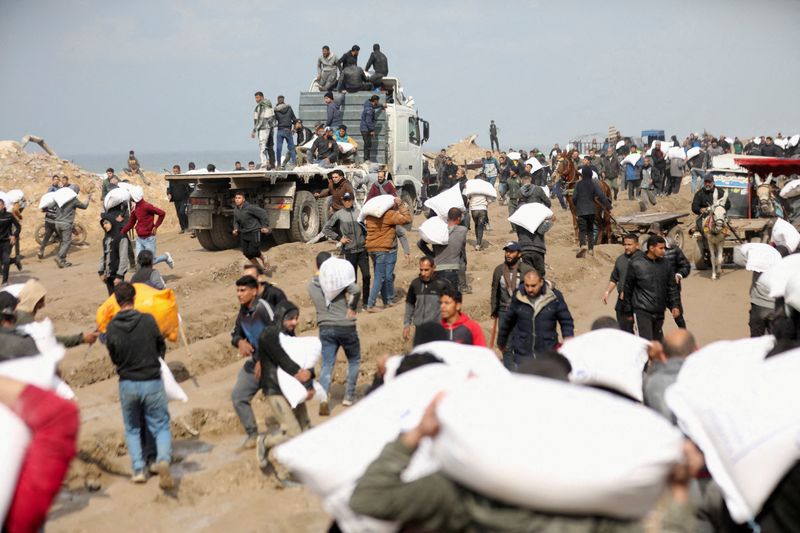By Simon Lewis, Humeyra Pamuk and Jonathan Landay
WASHINGTON (Reuters) - From air drops of humanitarian aid to supply ships from Cyprus, the United States is urgently seeking ways to feed the people of Gaza as Israel resists Washington's push for more aid access and U.S. efforts to broker a truce in the war test global patience.
With more than half a million people in the besieged enclave facing a looming famine amid Israel's military offensive, residents are desperate and aid deliveries have become chaotic and deadly.
On Thursday, over 100 Palestinians were killed by Israeli fire while waiting for an aid delivery, Palestinian health officials said. Israel denied it was to blame, saying many victims were run over by aid trucks.
Under pressure at home and from allies abroad to act, the Biden administration is considering expensive proposals more often associated with natural disasters and the Cold War era.
The White House on Friday announced plans for military airdrops of food and supplies into Gaza in the coming days. France has already made several such deliveries to Gaza with Jordan and others in the region.
Another possible option is shipping aid by sea from Cyprus, some 210 nautical miles off Gaza's Mediterranean coast, said a U.S. official. U.S. officials visited Cyprus this week to examine a possible maritime aid operation, the official said.
White House spokesperson John Kirby (NYSE:KEX) said on Friday the United States would redouble efforts to open up a maritime corridor to Gaza to bring "hopefully large amounts" of aid by sea.
The details of such an operation, including where in Gaza supplies could be unloaded, were not clear. The U.S. official said the administration is considering using military or commercial ships, and it would be "complex in terms of securing a landing site".
No decision has been made on military involvement in such an operation, said the official, adding the Israelis were "very receptive" to the sealift option because it would avoid delays from protesters blocking land crossings to aid convoys.
The air drop idea has drawn skepticism from some in the humanitarian community.
"It's insane that the entity necessitating this expensive workaround is not ISIL (Islamic State) ... or the Soviets ... but a U.S. ally fighting a war with full U.S. backing," said Jeremy Konyndyk, president of Refugees International, referring to Israel.
"Airdrops are massively expensive and low-volume ... The fact that they need be considered is a major policy failure."
Israel says it is committed to improving the humanitarian situation in Gaza, and accuses Hamas militants of endangering Palestinian civilians by using them as human shields.
Asked about the options being considered by the U.S., a spokesperson for the Israeli embassy in Washington referred to a statement on Thursday in which Israeli military spokesperson Daniel Hagari said Israel was coordinating aid deliveries and wants humanitarian aid to reach the enclave's people.
"We are working around the clock to make this happen," Hagari said in the video statement. "Israel puts no limits on the amount of aid that can go into Gaza."
UNSAFE FOR AID WORKERS
Aid deliveries to Gaza, particularly the north, have been rare and chaotic, as increased lawlessness, looting and the breakdown of the public order following Israel's military offensive that has killed more than 30,000 Palestinians has made it extremely unsafe for aid workers to operate.
The conflict began with a Hamas attack into southern Israel from Gaza on Oct. 7 in which the militants killed 1,200 people and abducted more than 250.
Thursday's incident near Gaza City was the biggest loss of civilian lives in weeks. Hamas said it could jeopardize talks in Qatar aimed at securing a ceasefire and the release of Israeli hostages. Hopes had been growing of a truce before the March 10 start of the Muslim fasting month of Ramadan.
The U.N. and relief agencies have criticized Israel for denying attempts to transfer humanitarian aid to northern parts of Gaza, restricting movement and communications.
The Biden administration says the best solution to the humanitarian crisis would be a temporary ceasefire, but as the negotiations drag on, it too is showing frustration with the government of Prime Minister Benjamin Netanyahu.
At a United Nations Security Council meeting on Tuesday on hunger in Gaza, the United States was blunt about the responsibility of its ally.
"Simply put, Israel must do more," Deputy U.S. Ambassador to the U.N. Robert Wood told the Security Council.
Who provides security for aid shipments has emerged as a major problem. The U.N. does not have its own guards and Israeli forces have attacked Palestinian police who escorted aid trucks, accusing some of them of belonging to Hamas.
Without giving details, State Department spokesperson Matthew Miller said U.S. officials were considering a number of aid measures. He also said Washington was talking to Israel to get a border crossing in northern Gaza opened.

Miller said there are "security and technical challenges" with opening more border crossings, but that Israel has been willing to work through them.
He said Washington had previously intervened to convince Israel to open two border crossings in the south of Gaza that it had closed. "It's not something that happened overnight," he said. "It's something we pushed for repeatedly."